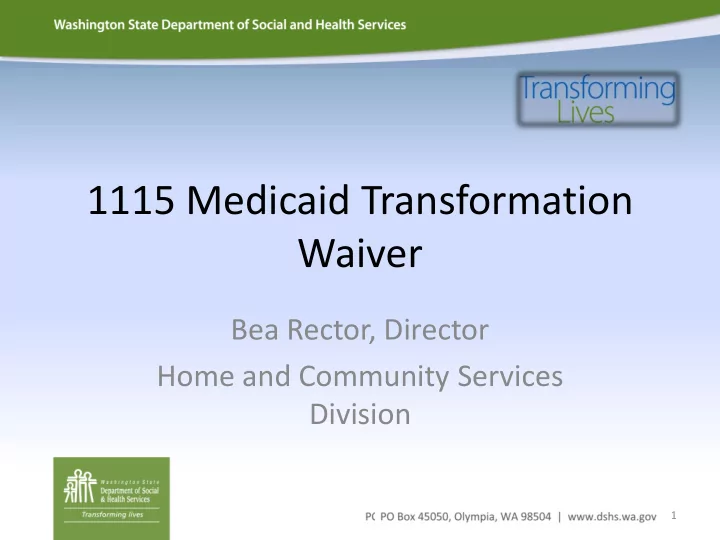

1115 Medicaid Transformation Waiver Bea Rector, Director Home and Community Services Division 1
Goals of Presentation • What is the waiver • What is Initiative Two • Where are we in negotiating the waiver • Connection with Alzheimer’s State Plan 2
Healthier Washington is creating healthier communities and sustainable health systems by: Building healthier Ensuring health care Improving how we communities focuses on the whole pay for services through a person collaborative regional approach 3
Healthier Washington recognizes that good health depends on high- quality health care and more… Health Care 20% Socioeconomic Factors Physical 40% Environment 10% Health Behaviors 30% Adapted from: Magnun et al. (2010). Achieving Accountability for Health and Health Care: A White Paper , State Quality Improvement Institute. Minnesota. 4
A transformed system = transformed lives Current System Transformed System Fragmented clinical and financial Integrated systems that deliver approaches to care delivery whole person care Disjointed care and transitions Coordinated care and transitions Disengaged clients Activated clients Capacity limits in critical service Optimal access to appropriate areas services Individuals impoverish Timely supports delay or divert need for themselves to access long term Medicaid LTSS services and supports (LTSS) Standardized performance Inconsistent measurement of measurement with accountability delivery system performance for improved health outcomes Volume-based payment Value-based payment 5
What the Medicaid Transformation waiver does for Washington state: • Provides flexibility and expenditure authority to achieve our vision for a Healthier Washington. • Allows us to test, scale, and spread successful models of care. • Supports providers in building capacity. • Builds connections within communities that allow for the right care, at the right place, at the right time, with the right provider. 6
Medicaid Transformation Waiver Initiatives Transformation through Accountable Communities of Health Each region, through its Accountable Community of Health, will be able to pursue projects that will transform the Medicaid delivery system to serve the whole person and use resources more wisely. Service Options that Enable Older Adults to Stay at Home and Delay or Avoid the Need for More Intensive Care A broadened array of Long Term Services and Supports (LTSS). Targeted Foundational Community Supports Targeted supportive housing and supported employment services will be offered to Medicaid beneficiaries most likely to benefit from these services. 7
In addition, there will soon be many more people age 65 and over in our state... Source: Washington State Department of Social and Health Services, Research and Data Analysis Division 8
…and their health care needs are likely to increase as they age. • By 2035, the number of people age 75 or older will have risen by roughly 150%. • Between 2010 and 2040, we anticipate a 181% increase in Medicaid clients over age 65 with Alzheimer’s. • 70% of people who reach the age of 65 are likely to need long term supports and services at some point in their lives. • Biennial expenditures by the state for long term supports and services are currently $3.4 billion — or 6 percent of all general fund spending. Data provided by Research and Data Analysis, DSHS, June 2015. 9
Initiative 2: Long-Term Services and Supports • Broadening the array of service options that enable individuals to stay at home and delay or avoid the need for more intensive care • Continued success is contingent on continued service delivery innovation 10
Washington is seeking an 1115 Demonstration Waiver to Sustain and Continue LTSS Innovation The LTSS System of the Future Must: • Provide effective services for individuals before they spend down to Medicaid • Provide effective supports to unpaid family caregivers • Promote the right service at the right time and place • Have the capacity to meet the needs of the population • Strategically target LTSS Medicaid investments to slow the growth rate of public expenditures 11
Medicaid Alternative Care (MAC) A new choice designed to support unpaid caregivers in continuing to provide quality care Age limit 55+ Estate Waived for services provided under the MAC benefit. Recovery Cost sharing No Resources Must meet Medicaid requirements. spousal impoverishment protections will apply to this population so potentially higher resource limits for married couples. Income Medicaid Eligible No specific income level. Applicant must be eligible for CN (categorically needy) or ABP (alternate benefit plan). 12
Tailored Services for Older Adults (TSOA) A new eligibility group to support individuals who need LTSS and are at risk of spending down to impoverishment Final Proposal Age limit 55+ Income For single: 300% Federal Benefit Rate ($2,199 based on 2016 standards). Will use community income rule for married applicants. Post- No cost sharing or ‘participation’ for TSOA recipients. eligibility cost sharing Estate Waived for services provided under the MAC benefit. recovery Resources Asset limit of: - $53,100 for a single individual - $53,100 plus $54,726 for a spouse not receiving services 13
Proposed Benefit packages: MAC & TSOA • Caregiver Assistance Services : Services that take the place of those typically performed by unpaid caregiver. • Training and Education : Assist caregivers with gaining skills and knowledge to care for recipient. • Specialized Medical Equipment & supplies : Goods and supplies needed by the care receiver. • Health Maintenance & Therapies : Clinical or therapeutic services for caregiver to remain in role or care receiver to remain in home. • Personal Assistance Services: Supports involving the labor of another person to help recipient (TSOA only). 14
How Does Waiver Support Alzheimer’s State Plan Goals Ensure access to comprehensive supports for family caregivers Education and Information Support Groups Respite Identify dementia early and provide evidence based care Early diagnosis and treatment 15
Waiver Update • Discussions with CMS are ongoing-momentum across all initiatives • Seeking Waiver approval April-May 2016 • Implementation activities underway • January 1, 2017 implementation goal for Initiative 2 16
Recommend
More recommend